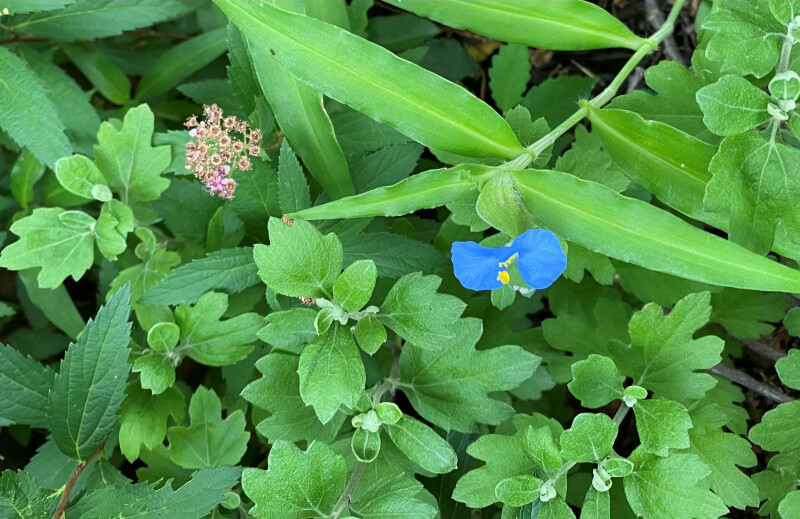
Weeds. It’s a constant battle to keep them out of my yard. I mulch and fertilize, but still have weeds that pop up here and there. However, there’s one particular “weed” that I never pull up. In fact, I love and nurture it. According to the Lady Bird Johnson Wildflower Center, Widow’s Tears (Commelina erecta) gets it’s name from the liquid that drops from the boat-shaped spathe at the base of the flower when squeezed. Also called “day flower,” this plant’s flowers only last one day and vary from purple to blue in color. These are considered weedy but are quite lovely little flowers related to spiderworts.
The first time I noticed Widow’s Tears was in my previous yard. I was intrigued by the tiny blue flowers—so fragile, lasting only a day. When I discovered their poignant name, I was taken aback because, at the time, I was facilitating a grief workshop. Seeing them (I have Widow’s Tears in my flower bed today) continues to remind me of the people I know working and living through their grief. Some are struggling to survive each day, others are beginning to see glimpses of hope on the horizon and others are somewhere in between.
One of the hardest things to hear when I’m working with grieving people is that they don’t feel understood—by family, friends or the culture in general. “Dad, I think it’s time you moved on.” or “Let’s go shopping! That’ll snap you out of your sad mood.” What grieving people really need is space—the space to cry, to feel, to reflect, to remember. They also need a listening ear so that they can talk about their loved one, their loss, their feelings. Grieving people don’t need to be hurried along or told how they should grieve. They need to be loved and companioned through this time of pain and growth.
How do we companion someone who has lost a loved one? Henri Nouwen said it best:
When we honestly ask ourselves which persons in our lives mean the most to us, we often find that it is those who, instead of giving advice, solutions or cures, have chosen rather to share our pain and touch our wounds with a warm and tender hand. The friend who can be silent with us in a moment of despair or confusion, who can tolerate not knowing, not curing, not healing and face with us the reality of our powerlessness. That is a friend who cares.
My hope and prayer is that this beautiful blue wildflower will sprout up in your garden. May it be a reminder that if you live long enough, you will grieve the loss of a loved one at one time or another. And, when you do, you will need space to grieve and someone to walk with you and listen to you, someone who will love and nurture you on your way.

